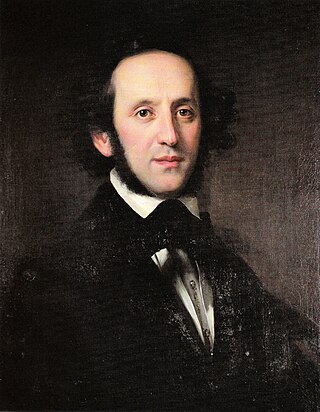
Jakob Ludwig Felix Mendelssohn Bartholdy, widely known as Felix Mendelssohn, was a German composer, pianist, organist and conductor of the early Romantic period. Mendelssohn's compositions include symphonies, concertos, piano music, organ music and chamber music. His best-known works include the overture and incidental music for A Midsummer Night's Dream, the Italian Symphony, the Scottish Symphony, the oratorio St. Paul, the oratorio Elijah, the overture The Hebrides, the mature Violin Concerto, the String Octet, and the melody used in the Christmas carol "Hark! The Herald Angels Sing". Mendelssohn's Songs Without Words are his most famous solo piano compositions.

Fanny Mendelssohn was a German composer and pianist of the early Romantic era who was known as Fanny Hensel after her marriage. Her compositions include a piano trio, a piano quartet, an orchestral overture, four cantatas, more than 125 pieces for the piano and over 250 lieder, most of which were unpublished in her lifetime. Although lauded for her piano technique, she rarely gave public performances outside her family circle.

Lobgesang, Op. 52, is an 11-movement "Symphony-Cantata on Words of the Holy Bible for Soloists, Choir and Orchestra" by Felix Mendelssohn. After the composer's death it was published as his Symphony No. 2 in B-flat major, a naming and a numbering that are not his. The required soloists are two sopranos and a tenor. The work lasts almost twice as long as any of Mendelssohn's purely instrumental symphonies.

Die erste Walpurgisnacht is a poem by Johann Wolfgang von Goethe telling of efforts by Druids in the Harz Mountains to practice their pagan rituals in the face of new and dominating Christian forces.
Felix Mendelssohn wrote four pieces for string quartet that were published together as his “Opus 81” after his death. They have at times wrongly been presented as a single work, even as his “String Quartet No. 7”:

Psalm 42, Op. 42 Wie der Hirsch schreit is a cantata by Felix Mendelssohn, setting Psalm 42 in German. It was written and published in 1837 for soloists, mixed choir and orchestra.

Harald Feller is a German organist, choral conductor and composer teaching at the Hochschule für Musik und Theater München. He was awarded the 1983 Grand Prix du Disque Liszt.
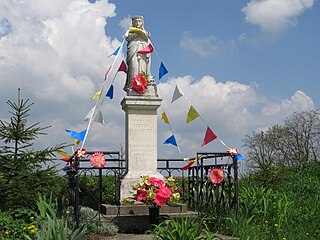
Psalm 115 is the 115th psalm of the Book of Psalms, beginning in English in the King James Version: "Not unto us, O LORD, not unto us, but unto thy name give glory". It is part of the Egyptian Hallel sequence in the fifth division of the Book of Psalms.
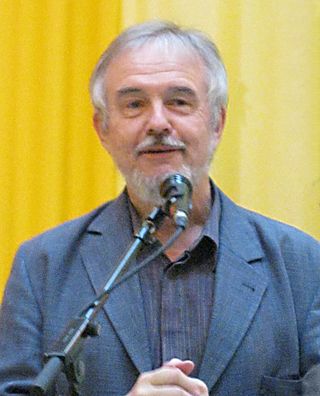
Peter Planyavsky is an Austrian organist and composer. He attended the Schottengymnasium. After graduating from the Vienna Academy of Music in 1966 he spent a year in an organ workshop, and has been instrumental in organ-building projects, notably the construction of the Rieger organ in the Great Hall of the Wiener Musikverein. In 1968 he was appointed organist in the Upper Austrian Stift Schlägl, and the following year organist at Vienna's St. Stephen's Cathedral. From 1983 until 1990 Planyavsky was their director of music, with overall responsibility for church music at the cathedral.

Dir, Herr, dir will ich mich ergeben, WAB 12, is a sacred motet composed by Anton Bruckner in c. 1845.

"Mitten wir im Leben sind mit dem Tod umfangen" is a Lutheran hymn, with words written by Martin Luther based on the Latin antiphon "Media vita in morte sumus". The hymn in three stanzas was first published in 1524. The hymn inspired composers from the Renaissance to contemporary to write chorale preludes and vocal compositions. Catherine Winkworth translated Luther's song to English in 1862. It has appeared in hymnals of various denominations.
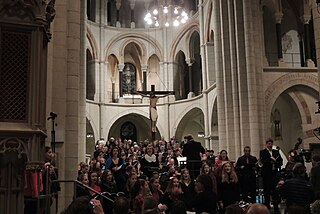
Laudato si' is an oratorio composed in 2016 by Peter Reulein on a libretto by Helmut Schlegel. Subtitled Ein franziskanisches Magnificat, it includes the full Latin text of the Magnificat, expanded by writings of Clare of Assisi, Francis of Assisi and Pope Francis. The composer set it for five soloists, children's choir, Choralschola, mixed choir, symphony orchestra and organ. It was published in 2016 by the Dehm Verlag, and was premiered on 6 November 2016 at the Limburg Cathedral, conducted by the composer.
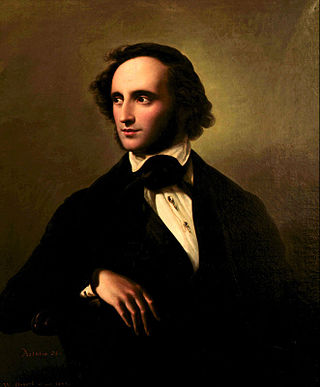
Jauchzet dem Herrn, alle Welt, WoO. 28, is an anthem for choir a cappella, a setting of Psalm 100 in German composed by Felix Mendelssohn in 1844. It was published in 1855 after the composer's death. It is the most popular setting of Psalm 100 by Mendelssohn, who also wrote a four-part motet in Latin, "Jubilate Deo", as part of Three Motets, Op. 69, in 1847 for use in the Church of England, which adds a doxology to the psalm text. He set the psalm again, but with paraphrased text by Ambrosius Lobwasser, "Ihr Völker auf der Erde all", as part of Sieben Psalmen, harmonising melodies from the Genevan Psalter.

Lord, have mercy upon us, WoO. 12, MWV B 27, is the incipit of a motet for choir a cappella in both English and German composed by Felix Mendelssohn in 1833. It is also known in English as Responses to the Commandments, and in German as Zum Abendsegen. It was published in 1842, both in English and German, and by Breitkopf & Härtel in 1875 in the complete edition of the composer's works.

Denn er hat seinen Engeln befohlen, MWV B 53, is the incipit of a motet for an eight-part choir a cappella by Felix Mendelssohn. He wrote it in 1844 for the Berlin Cathedral, setting verses 11 and 12 from Psalm 91. Later, Mendelssohn made the motet with accompaniment part of his oratorio Elijah. It was published in 1844, and by Breitkopf & Härtel in 1875 in the complete edition of the composer's works.

Verleih uns Frieden is a chorale cantata by Felix Mendelssohn, setting a prayer for peace by Martin Luther. Mendelssohn composed the short work in one movement for mixed choir and orchestra in 1831. It is also known as Verleih uns Frieden gnädiglich.

Sechs Lieder, Op. 59, is a collection of six part songs for four voices a cappella by Felix Mendelssohn. He composed the songs between 1837 and 1843, setting six poems in German. They are subtitled "Im Freien zu singen", and focus on nature. They were published after his death as part of his complete works. One of the songs, "O Täler weit, o Höhen" became so popular that it is also regarded as Volkslied.

Drei Motetten, Op. 39, is a collection of three sacred motets for women's voices and organ by Felix Mendelssohn. Composed in 1830 for different liturgical occasions and in different scoring, they were published together in 1838.

Wer bis an das Ende beharrt, is a motet for a four-part choir by Felix Mendelssohn. He wrote it as part of his oratorio Elijah, published in 1847.












